Evolution?
Background:
Most people seem to believe it’s evolution vs. creation, as though it’s either one or the other, winner-take-all. Within just a few months, several parents, whose children ranged from middle school to college, came to me stating the instructor began their lessons on evolution stating to either one student, or the class as a whole, you must either believe what your parents and/or churches tell you, or what we are learning here. Those educators need to be better educated before they miseducate even more students.
You may have observed discussions surrounding evolution and God typically get bogged down as they involve so many opinions, biases, information, misinformation, etc. This is further hindered as most of us don’t have proper background or practice because thinking and discussions regarding the interaction between evolution and God have been pushed out of our education system. Additionally, it’s too difficult in our culture to have a discussion long enough to cover all the details necessary, and stay on track to give people sufficient evidence to move from their current comfortable beliefs for or against evolution.
Therefore, the most useful approach may be simply to recognize evolution, regardless of whether accurate or not, cannot prove or disprove the existence of God, people make too much out of this topic. Evolution should be recognized as only a minor player in the questions surrounding the existence of God, and maybe we can keep the emotions out of the otherwise interesting discussions.
Before starting, here is my background: My personal bias is I believe there is a God behind the Bible. I also think certain aspects of evolution have very good evidence and are accurate, but do not accept what the general public considers “evolution” (the Modern Synthesis Model combining Mendelian genetics with Darwinian evolution), and not because of supposed conflicts with the Bible, but I think this theory will eventually be dropped due to science.
While not an expert in evolutionary biology, I do know the signs of an unhealthy theory in science. For example, instead of diverse theories coming together to form a more robust, clear model, crucial components, such as the origin of life models, go the opposite direction, they diverge away from each other due to recognized failings in each other, and begin to litter the landscape with insufficient or failed models.
Survival of the fittest is not just a feature in evolution, it works very well in scientific ideas or models, which is why the Modern Synthesis evolution model will likely not survive as it is not the most fit scientific theory. Not all aspects of it will die, as there is good evidence for some aspects, and since we never stop looking for natural explanations, another theory will take its place.
Regardless of my views, the essential fact of the matter does not change: evolution, whether completely accurate or entirely false, cannot prove or disprove the existence of God. Further, discoveries from studying evolution, and biology in general, provide robust evidence of something personal, beyond all nature and chance, being required for sufficient explanation of what we find in nature.
Evolution, whether accurate or not, is incapable of informing us whether God exists or not.
Answer 2: So what?
If you believe evolution disproves God, you are making an error in logic, known as a non-sequitur. Even if an evolutionary theory were completely accurate, it just does not follow that no God is involved.
Imagine looking into a petri dish, we observe non-living material and natural environment creating information-containing DNA or RNA, and after becoming encased in a cell membrane, combines functionally with other required components and becomes a living organism. And this organism reproduces, eventually changing and reproducing to become all known forms of animals, even sentient humans (there was a funny Simpsons episode, as well as a Love, Death, and Robots episode on this). So what?
Does this mean no God was involved? No. Believing that is an error in thinking or logic known as a non-sequitur. Just because we observed all of life forming naturally does not allow the leap in logic that an entity, which transcends the nature we study, was not also involved.
Ask a person making such a claim: How do you know that there is no guidance? How could you possibly determine that? Because, as philosopher Alvin Platinga makes clear, science is incapable of determining no intelligent guidance was involved in perhaps: fine-tuning the initial conditions, preserving specific populations or gene expressions over others, increasing the probabilities involved with certain favored mutations, or even special one-time acts.
On the other hand, if evolution were disproven tomorrow, so what? It does not prove a purposeful Creator was involved. So, whether evolution is accurate or not, it doesn’t provide an answer to the most important question, whether God is involved or not.
Answer 3: Let’s just say an evolutionary theory is entirely correct and see where it goes …
As far as evolution: it’s too difficult in our culture to have a discussion stay on track and cover all the details necessary to give people sufficient evidence to move in their stance on this issue. Therefore, cut the legs out from the entire argument by saying: “If evolution were accurate, so what does that mean?”
- There is not a single accepted evolutionary theory in any peer-reviewed science textbook, which states, “This is how life evolved naturally, and no intelligent guidance or actions from God were involved.” No theory will state that because science is incapable of making such a claim. Science can only view and explain how the initial conditions and natural laws in nature can explain cause and effect.
Science is incapable of viewing anything beyond nature (nature includes all matter, energy, space, and time; all the universe), and anyone making such a claim has stepped outside of science, and into the realm of philosophy (and they are doing bad philosophy in doing so).
What may amaze you (because our education system has not educated well in this area) is that science is capable of discovering things within nature, which show properties or activity existing beyond science’s view, or the natural order. And this evidence has already come in!
You can find examples in The CAUSED Evidence, where some of the greatest discoveries in astronomy and physics, as well as research in mathematics and philosophy demonstrate a cause of the universe outside of, or beyond, all of nature. Further, studies in genetics, often used to promote evolution, at the same time give clear evidence of a personal cause involved in the existence of life.
DNA is mathematically equivalent to language or computer code, and code have never existed unless having been produced by an intelligent and purposeful agent. Both DNA and computer code utilize a system of instructions as an operating system for the hardware (body). DNA uses a four-letter alphabet (the nucleotide bases labeled A, C, G, T) just as computer code uses a binary alphabet (0 and 1). These letters (A, C, G, T) are chemicals, but function as information, and specific sequences of these letters code for specific proteins that perform specific functions for the body (like specific words function in a language or computer code modules perform functions).
In fact, the co-discoverer of the double-helix structure of DNA, Francis Crick, was a code-breaker in the war. Neither natural processes, nor chance, nor a combination of the two are capable of explaining the origin of information or information processing systems found in cells. Codes of such information content are always developed by an intelligent agent with a purpose.
Here is a little more detailed information for those interested in how DNA works, and for those not interested in the more technical details, skip this and the next paragraph. Watson and Crick explained the structure of the DNA molecule by 1953, and it was startling to find this structure of DNA is purposed for information storage in the form of a four-character digital code. Strings of exactly sequenced chemicals, nucleotide bases, store and transmit information, specifying the assembly instructions our cells use to build the protein molecules and machines for cells and us to live.
Crick later proposed his famous “sequence hypothesis.” As letters come together in specified patterns of the English language to transmit information according to the purpose of the author, or symbols are specifically placed together by a computer [programmer, following the external computer code, to achieve their designated goal, the specific sequences of chemical bases along the spine of a DNA molecule, act as letters in language or symbols in computer code, to convey precise instructions to build proteins. The DNA molecule has the exact property of “sequence specificity” demonstrated in languages and code.
Biologist Richard Dawkins described it clearly, “The machine code of the genes is uncannily computer-like. Apart from differences in jargon, the pages of a molecular biology journal might be interchanged with those of a computer engineering journal.”
Bill Gates, when recognizing the equivalence of DNA to code, stated, ”DNA is like a computer program but far, far more advanced than any software ever created.”
The capacity of DNA to store information vastly exceeds that of any man-made system. Think about it, the storage capacity would have to be so far more advanced than modern computing power because even an amoeba requires 1000 encyclopedias worth of information contained in a single DNA.
Richard Dawkins (1995). “River Out of Eden: A Darwinian View of Life”, Basic Books (AZ)
Gates, The Road Ahead, Penguin: London, Revised, 1996 p. 228
DNA is so efficient in information storage that all the information needed to specify an organism as complex as man weighs less than a few thousand millionths of a gram. Think of the most-advanced flash drive we have, and with some of the best minds and money involved its storage capacity is a joke compared to DNA. Scientists are working to tap into the use of DNA for storage of other information, and if we had a DNA flash drive the size of a teaspoon, it could store the information necessary to specify the design of all the species of organisms which have ever existed on the planet, and there would still be room left for all the information contained in every book ever written.
Alvin, Platinga, Where the Conflict Really Lies: Science, Religion, and Naturalism (Oxford University Press), 2011.
DNA has 45 trillion times more information storage capacity than our best computer chip. Doesn’t this make you think? The best minds and resources we have are trying to copy what they find in nature, there are countless examples of this beyond DNA and nanomachines in our cells. If you want to copy or cheat on an exam, you do not try to copy from a less intelligent student, or something in nature, like a rock.
An article, “DNA Data Storage Is About To Go Viral”, gives a clear picture:
Tech giants including Facebook and Amazon and their millions of users generate petabytes of data on the Internet every second. Microsoft has been quietly working in the background to store this information in As, Ts, Cs, and Gs, instead of 0s and 1s.“Think of compressing all the information on the accessible Internet into a shoebox,” says Karin Strauss, a principal researcher at Microsoft. “With DNA data storage, that’s possible.”Strauss is working with Luis Ceze, a professor of computer science and engineering at the University of Washington, to wield DNA for data storage and computing. Using synthetic DNA molecules, the team has successfully stored over one gigabyte of readable information, including various forms of media such as the top 100 books from Project Gutenberg, a high-definition OK Go music video, and the #MemoriesInDNA project.The information density of DNA is remarkable — just one gram can store 215 petabytes, or 215 million gigabytes, of data. For context, the average hard drive in a laptop can house just one millionth of that amount.“We encode all data at a molecular level, making it as small as possible, and store it in a medium that will last for quite a while and not become obsolete, like floppy disks, because of its eternal relevance for life,” says Strauss.
Additionally, research has discovered the digital information in DNA and RNA is just a part of the complex information processing system all living things use, all involving advanced nanotechnology, which is comparable to, but far exceeds the best humanity has produced in complexity, design logic and information storage density.
Information and information processing systems of this level invariably arise from intelligent, purposeful agents. Therefore, if all codes ever known have been produced by purposeful intelligence, and DNA is a code, although far more advanced in its storage capacity, elegance, end results, etc., than anything the brightest minds have ever created, then why do you believe it was created by mindless chance?
John Cumbers, “DNA Data Storage Is About To Go Viral“, Forbes, August 3, 2019.
Physicist Paul Davies expresses it well: “Once this essential point is grasped, the real problem of biogenesis is clear. Since the heady successes of molecular biology, most investigators have sought the secret of life in the physics and chemistry of molecules. But they will look in vain for conventional physics and chemistry to explain life, for that is a classic case of confusing the medium with the message. The secret of life lies, not in its chemical basis, but in the logical and informational rules it exploits.” Paul Davies, The 5th Miracle, p. 216)
And finally, every mechanism proposed for the origin of life—be it through “protein first” models, “RNA first” models, or any other model—requires an explanation for the existence of genetic information. Cambridge education Philosopher of Science, Stephen C. Meyer, says “Proposals that merely transfer the information problem elsewhere necessarily fail because they assume the existence of the very entity—specified information—they are trying to explain. And new laws will never explain the origin of information, because the processes that laws describe necessarily lack the complexity that informative sequences require. To say otherwise betrays confusion about the nature of scientific laws, the nature of information, or both.” (Stephen Meyer, Signature in the Cell, p. 268)
German engineer and Information Theory specialist, Werner Gitt summarizes it this way: “A necessary requirement for generating meaningful information is the ability to select from alternatives and this requires an intelligent, volitional entity . . . Unguided, random processes cannot do this—not in any amount of time—because this selection process demands continuous guidance by intelligent beings that have a purpose.” Werner Gitt, Without Excuse, pp. 50-51)
Science points emphatically to the reality of intelligent agency beyond the capability encircled by nature and chance alone.
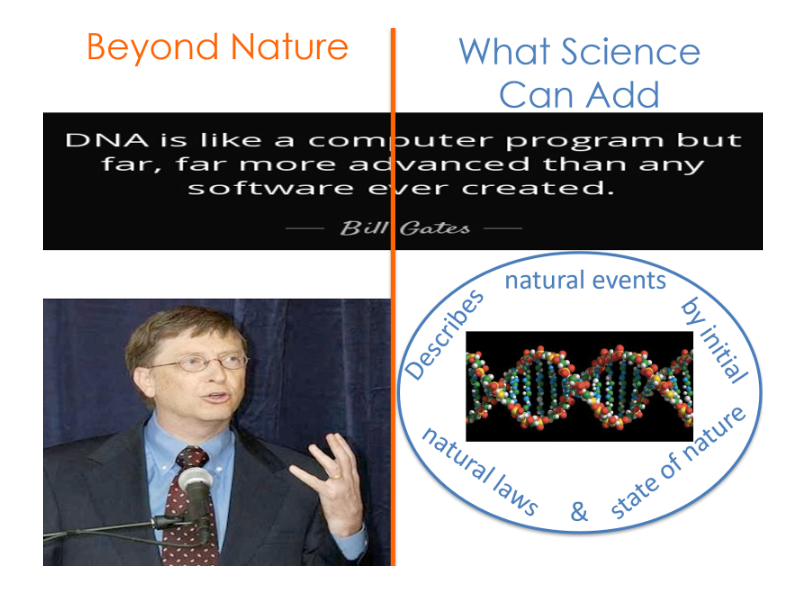
Answer 4: Science is incapable of claiming God is not involved.
I was asked to speak at a University of Michigan campus on “Darwin’s Day,” and was told an evolutionary biology professor, who was also an atheist, would be in to cross-examine me. The title I gave the presentation was, “Evolution v Creation, Much Ado about Nothing.”
While I addressed both facts supporting aspects of evolution and facts refuting aspects of evolution, the main point was anyone who says they can’t believe in God because they believe in evolution, or can’t believe in evolution because they believe in God, has a shallow understanding of science, the Bible, or both. Highlighting the fact that, as far as the existence of God is concerned, the topic of evolution isn’t even a serious player.
At the end of the talk, when questions were being asked, eventually the moderator asked if the evolutionary biology professor had any questions or challenges. The professor said one of the Hebrew words could be translated another way, after discussing his point, the moderator gave a slight laugh and added, we brought you in to challenge Scott’s points, do you have any other challenges against the points made in the presentation against your field of study. The professor said “No.” There was awkward silence for a bit as the students had been conditioned to think evolution and creation were absolute adversaries.
The faulty phrase “Evolution v Creation” not only leads a person to a false dichotomy between the two models, but also the whole topic is insignificant in the overall discussion about whether God exists or not.
Think about it. From the beginning of the universe, the cause and development of the universe, and in so many diverse areas of study, there is so much directly applicable evidence to the question of the existence of God, and all this origin and development of the universe has to happen before evolution even gets started!
Our culture has developed a short attention span, especially when discussing challenging topics, and has also been in an education system from K-12 and in the universities, which is constrained to explain everything without God. Having taught in public schools, I understand why, we don’t want to indoctrinate. But, of course, when you attempt to explain everything without God, that’s indoctrination, and such teaching should be tested for truth.
On the other hand, proponents of evolution may claim many church teachers have antagonistic stands towards evolution, and considering many of these religious teachers are not scholars in biblical hermeneutics or science, their teaching should also be tested for truth. Actually, proponents of evolution will most likely ask why would they believe an ancient book’s position on reality, when science has done such a great job explaining so much already, and they will simply trust science’s current consensus on evolution.
All good points, and worthy of a rich and deep discussion. Instead, of fighting against attention span, decades of indoctrination (either from potentially inaccurate education system or church teachings) it’s much more useful to simply say, “So what?”
Even if evolution were entirely accurate, even if I had a petri dish, and observed non-living material become a living cell, and watched as that cell turned into many cells, then an organism, then reproduce, then diversify into every living creature we have on Earth – so what do you think that means? That this natural occurring process means God is not involved? Of course not.
Science explains natural events or things in nature by considering the initial state of nature (how a system began) and the natural laws involved, which take a system from where it began to its current state.
This area, shown by the circle in the image, is what science is capable of studying and making statements about. For example, how did the water in the teapot come to boil?
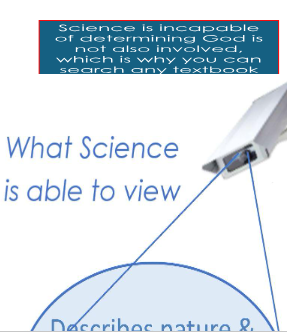
Initially, the water in the teapot came from the tap, and was at or below room temperature. Then, once the oven was turned on, heat is transferred to the water molecules following the natural laws involved with conduction and convection, until the water molecules have enough thermal motion, which is a type of kinetic energy, so the motion exceeds the strength of the hydrogen bonds between the molecules, causing some water molecules to separate from other molecules resulting in steam. This is a natural explanation using initial conditions and natural laws, all within the circle of what science is capable of explaining.
Let’s get more specific and use an example with a specific point of view, physics, and the bloody snow around a tree. Walking in a park at the edge of the University of Michigan campus, after the first big snowfall, we saw a broken food tray at the base of a tree with blood drippings all around it, and knew there was a scientific explanation for it. We knew excited students often gathered at the top of the adjacent hill, usually with big tubes or sleds, although some enthusiastic kids would use food trays stolen from the nearby dorm cafeteria (initial conditions: excited kid at top of hill with food tray). Observing a very steep slope of the hill, with the large tree standing at the base of the hill, we hypothesized the over-enthusiastic student slid down the hill, with momentum on the steep slope being high (natural laws at work), control of the ride was lost and the momentum led the ill-fated student to hit the tree, with tree giving back an equal and opposite force to the student’s face, leaving the evidence of a nasty crash.
When you know how something started (initial conditions) and how things behave in nature (natural laws), then you can explain the cause and effect we see in nature. This explanation was almost entirely within the specific view of physics, but maybe the view of physics isn’t the only view involved to correctly understand what we were seeing.
After unsympathetically laughing at the story physics had provided us, I started wondering how this student could be so unlucky, or stupid, to slam into the one tree, when 95% of the base of the hill was tree-free. Further, it was very unlikely the tray would have broken as it did, the blood looked a little suspect, a group of footprints were at the top of the hill with only one set of footprints back up the hill (meaning no one rushed down to help the supposed victim), and following the path of the tray down the hill showed unnatural turns, unless someone was purposefully trying to guide the tray toward the tree. At this point, we turned on our psychology camera also, and, using the combined view provided by both the physics and psychology cams, had a new hypothesis: the broken tray and fake blood scene was set up to capture the sick fascination of people who love a good train wreck.
While physics gave a somewhat adequate explanation, if there is something outside the area physics can view, then physics cannot see it and has nothing to say about it. You would have to use another camera, psychology or sociology in this case, which has a different view maybe covering the area outside the physics-limited view.
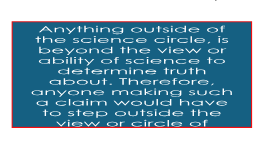
The same is true when studying other aspects of reality, and if you don’t think science’s view is limited, you are not using all your cameras well!
All that nature is, all the matter, energy, space and time, all of what is a part of our natural universe has been shown to have a beginning, in which all nature and time itself came into existence. If science has determined all of nature had a beginning and came into existence, what does that tell you about the cause? The cause cannot be a part of nature, because nature is what came into existence. We know the cause of the universe is beyond nature, and therefore, already have scientific verification of an agency beyond nature.
Further, when studying life, we find further evidences pointing directly outside of nature to the best explanation of what we found. Consider what was noted about DNA in Answer 2, or examples in the answers below.
Answer 5: Science pours a continuous flow of great information leading to a supreme intelligent agency behind life.
Science provides two general types of explanation: (a) natural and/or (b) personal agency.
In answer 3, we noted the information content and processing system of DNA, being mathematically equivalent to language or code, and observed even vastly less complex information content and systems have always been the result not of (a) natural causes, but (b) personal agency. It makes sense it took a codebreaker from WWII to be part of the team realizing DNA encoded the genetic information for all living things through the two chains of nucleotide pairs.
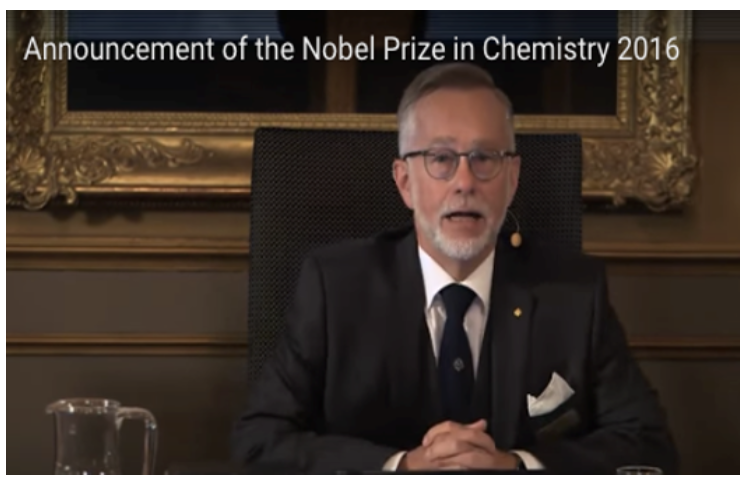
Another example one should consider in determining if all we see can be explained by (a) natural causes, or whether (b) personal agency is also part of the equation, are the Nobel Prizes in molecular biology over the past decade or so, specifically with nano-machines.
When interviewed, the Nobel Prize winners humbly remarked they simply copied what they found in our cells, and their brilliant work was dwarfed by the originals found in nature. Considering the best minds, best equipment, and massive funding is poured into research into these Nobel Prize winning creations, which by their own admission were copies of vastly superior examples throughout nature, one needs to consider whatever led to the original creations in nature is potentially more intelligent and better funded than the multiple Nobel Prize winning teams.
Below is a list of other Inventions, which were inspired or copied from nature. If you want to cheat on an exam, you don’t look to copy your answers from a rock, or an Ohio State University football player, you copy from one more intelligent than you.
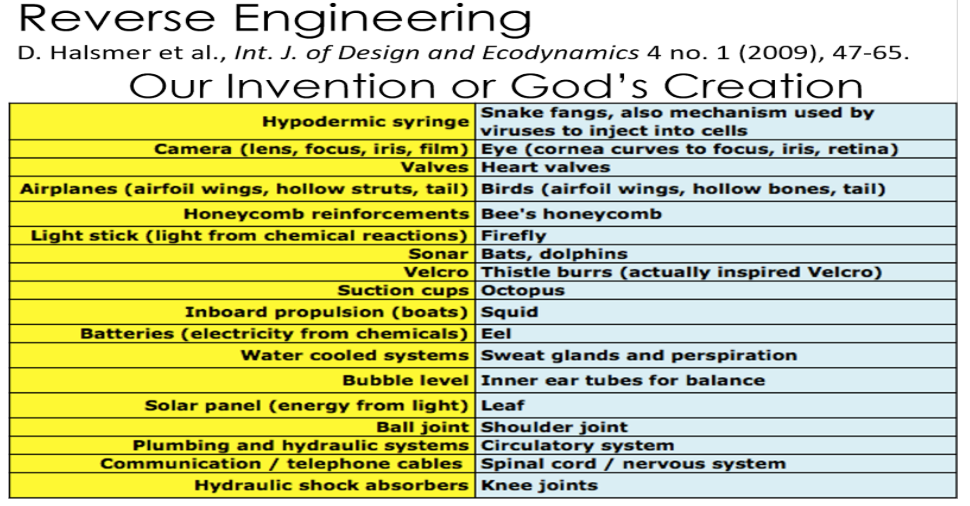
New articles come out every month or so in peer-reviewed scientific literature demonstrating nature and natural laws are not a sufficient explanation for what we find in nature.

Even great scientific accomplishments point this out. Consider the K-array supercomputer. German & Japanese scientists & engineers, through massive funding, intelligence, and effort have used the world’s 4th largest, combined 83,000 supercomputers, known as K-array (pictured at left), to simulate 1 second of brain activity, which took those 83,000 supercomputers 40 minutes to do. Not simulating consciousness, emotion or any of the good stuff, just the activity. Amazing scientific and engineering accomplishment.
You can do a napkin calculation comparing just the efficiency of the K-array and the human brain. Assuming the super-computer-array can operate without failure for 70 years, and very generously assuming the space containing the array is only 83,000 times larger than the brain, you discover that whatever cause led to the brain (either a personal agent + nature, or purely nature following simple natural laws), the cause is 440 quadrillion times more intelligent & better funded than the German and Japanese scientists and engineers who created the K-supercomputer array.
Answer 6: My prediction for Evolution, or the Modern Synthetic Theory of Evolution.
This prediction I made decades ago in talks at universities and churches, and has consistently grown stronger in evidence as time and discoveries move forward. Surely this is not an original or early prediction, as those whose careers are in the field of evolution knew this before me.
Here was my prediction: the Modern Synthesis (current theory of evolution), and especially the origin of life studies (OOL), demonstrate the hallmarks of a dying theory, but this theory will not be dropped by the scholars until a new theory replaces it, and we will get a new wave of overenthusiastic optimism for naturalism. We do not, and likely will not, see conglomeration and slight adjustments to create an even more robust theory, as is observed with the Lamba cold dark matter ΛCDM model (Big Bang theory), but instead a bunch of dead ideas and a withering theory due to lack of evidential nutrients. As stated previously, regardless of whether evolution was true or false, the biblical record is not significantly impacted, therefore, my thoughts about evolution failing are not due to the Bible, but to science.
There are definite aspects of the Modern Synthesis with accuracy well supported by evidence, yet I assume the overall theory has only been held on to through by proponent whose career and publishing depend upon the theory. This is only my claim as I have not researched to get my own evidence to back it up, because I don’t care enough. Even when the Modern Synthesis falls, it will be replaced by some new synthesis, likely with a strong focus on epigenetics.
Hornyak, Tim, “Fujitsu supercomputer simulates 1 second of brain activity,” C|Net, https://www.cnet.com/news/fujitsu-supercomputer-simulates-1-second-of-brain-activity/; Also, https://www.livescience.com/42561-supercomputer-models-brain-activity.html
Even worse, it will be replaced by aliens. The evidence surrounding the beginning and cause of the Universe, and even the origin of life, exposes atheism so thoroughly by directly providing evidence for logical arguments for the biblical God, people will start turning away from current falsified naturalist beliefs into science-fiction and equally invalid naturalist theories, such as aliens. This is already happening, in an interview for the documentary Expelled, Richard Dawkins, when asked if intelligent design could be involved in genetics and evolution, stated an “intriguing possibility” is that an advanced alien civilization could have seeded the Earth with life (panspermia, life coming from space, or directed panspermia, alien intelligence seeding the Earth had both previously been theorized), and it may be possible to “find a signature of some sort of designer”. So Dawkins is intrigued by the possibility of a theory having zero evidence supporting it (aside from entertaining Ridley Scott movies), and a lot of scientific evidence against even the possibility of any alien existence, but Dawkins is not intrigued at all by the signature of some sort of designer we already found within the code of DNA.
It was on episode #2008 on the Joe Rogan Experience podcast where Stephen Meyer confirmed what I had heard through another biologist. At the Royal Society Conference in 2016, an international group of evolutionary biologists noted they were not satisfied with Neo-Darwinism, the first talk even enumerated the major explanatory deficits of the modern synthesis, and noted the need for a new theory.
Here are some quotes from scholars in the field:
Eugene Koonin: “The summary of the state of affairs on the 150th anniversary of Origin is somewhat shocking: in the post-genomic era, all major tenets of the Modern Synthesis are, if not outright overturned, replaced by a new and incomparably more complex vision of the key aspects of evolution. So, not to mince words, the modern synthesis is gone.” [“The Origin at 150: Is a New Evolutionary Synthesis in Sight?,” Trends in Genetics Vol. 25:473, (2009): 474.] (Internal citations omitted).1
Kevin Laland and colleagues: “The number of biologists calling for change in how evolution is conceptualized is growing rapidly. Strong support comes from allied disciplines, particularly developmental biology, but also genomics, epigenetics, ecology and social science. We contend that evolutionary biology needs revision if it is to benefit fully from these other disciplines. The data supporting our position gets stronger every day. Yet the mere mention of the EES often evokes an emotional, even hostile, reaction among evolutionary biologists. Too often, vital discussions descend into acrimony, with accusations of muddle or misrepresentation. Perhaps haunted by the spectre of intelligent design, evolutionary biologists wish to show a united front to those hostile to science. Some might fear that they will receive less funding and recognition if outsiders — such as physiologists or developmental biologists — flood into their field.” [“Does evolutionary theory need a rethink? Nature 514 (October 2014), online]
Lynn Margulis (US Presidential Medal for Science recipient; originator of endosymbiotic theory): “At that meeting [Francisco] Ayala agreed with me when I stated that this doctrinaire neo-Darwinism is dead. He was a practitioner of neo-Darwinism, but advances in molecular genetics, evolution, ecology, biochemistry, and other news had led him to agree that neo-Darwinism’s now dead” [Suzan Mazur, The Altenberg 16 (Berkeley, 2010), p. 285)]
William Provine (Cornell University historian of science and evo-biologist): “[e]very assertion of the evolutionary synthesis below is false”: Natural selection was the primary mechanism at every level of the evolutionary process. Natural selection caused genetic adaptation…. Macroevolution was a simple extension of microevolution. … Evolution is a process of sharing common ancestors back to the origin of life, or in other words, evolution produces a tree of… The evolutionary synthesis was actually a synthesis.” [Abstract of talk before the History of Science Society titled “Random Drift and the Evolutionary Synthesis.” [online at hssonline.org]
